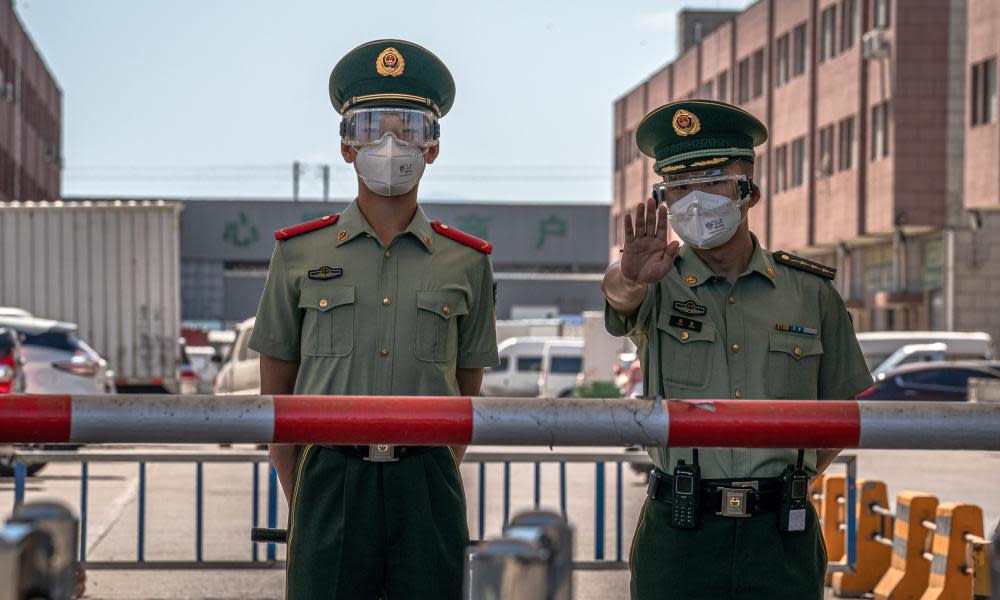Beijing lockdown tightens as new coronavirus outbreak spreads

Authorities in Beijing have locked down residential compounds and fired officials over a new Covid-19 outbreak, as health officials warned the risk of the outbreak worsening was “very high”.
On Monday, authorities announced 49 new cases, 36 of which were linked to the Xinfadi seafood supermarket in Beijing’s southern Fengtai district. The wholesale market was closed on Saturday after it was identified as being at the centre of a new cluster of cases.
Related: Only three out of 53 countries say US has handled coronavirus better than China
“The risk of the epidemic spreading is very high, so we should take resolute and decisive measures,” Xu Hejian, a spokesman for the Beijing city government, said at a press briefing on Monday. On Sunday he said Beijing had entered “an extraordinary period”.
As of Monday, ahttps://interactive.guim.co.uk/uploader/embed/2020/06/archive-zip/giv-39021cq345O9ik2d/ total of 21 residential communities, housing about 90,000 people, near Xinfadi as well as a second seafood market in Haidian district, where cases linked to Xinfadi were also confirmed, had been closed off. Residents have been ordered to quarantine at home and undergo tests for the virus.
Beijing, which had previously gone 55 days in which the only new infections were citizens returning from other countries, has reported a total of 79 cases in the past four days. The first case in the new outbreak was discovered on Thursday after a 52-year old man surnamed Tang was confirmed to have the virus. On Friday, authorities reported another six cases – all of them, including Tang, linked to the Xinfadi market.
Authorities fear the virus spreading from Beijing. Several Chinese cities have urged their residents not to travel to the capital. The city of Daqing, in the north-eastern province of Heilongjiang, has started to require travellers from Beijing to undergo 21 days of isolation.
Two cases in Liaoning province and three in the surrounding Hebei province are believed to be connected to those in Beijing. On Monday, Sichuan province reported one suspected case. A flight from Guangzhou in southern China to Dhaka, Bangladesh was cancelled after 17 passengers tested positive for the virus.
Residential compounds in Beijing have reinstated security checks and made loudspeaker announcements, phone calls and house visits asking all residents who have visited the Xinfadi market to report their recent travel. Schools have been suspended and temperature checks at malls and public places have resumed, after weeks of relaxed measures.
In an afternoon press conference, Xu Ying of the Beijing municipal party committee organisation department, said 7,200 neighbourhoods and 100,000 community workers had “immediately entered the battlefield to fight the epidemic”.
Related: 'China's lifeblood': street hawkers make surprise return to fire up ailing economy
The new cases in Beijing are especially alarming given the strict travel restrictions and quarantine measures the city imposed to prevent cases from other parts of the country spreading to the capital. Beijing had begun to return to normal with residents returning to work and going out again.
On Monday, two officials in Fengtai district, where the Xinfadi market is located, were dismissed while the manager of the market was also fired, according to state media for “failing” to implement virus prevention measures.
On Sunday, Beijing ordered all companies to vet their employees and require any who visited the Xinfadi market or had contact with those at the market to quarantine at home for 14 days. Authorities said on Sunday that more than 70,000 people were tested – 59 of whom tested positive for the virus.
After traces of the virus were found on chopping boards used for imported salmon, shops across the city have pulled salmon from their shelves. Fish farmers Norway Royal Salmon and Bakkafrost told Reuters China had stopped imports of salmon.
The closure of the Xinfadi market – a sprawling complex for sales of meat and produce as well as seafood that supplies as much as 80% of the city’s produce, according to state media – has raised concerns about food shortages. On Monday, officials pledged to increase supplies to keep prices and stocks stable.
Researchers said they were still investigating the origins of the new outbreak, with some suggesting it had come from overseas. “It is found that the virus came from Europe and the preliminary assessment is that the virus came from overseas,” said Yang Peng, an epidemiologist with the Beijing city government.
“But it is not clear how the virus came into this market,” Yang said, according to state media, adding that the virus could have been on contaminated meat or spread from the faeces of people at the market.
China, which has reported a total of 83,000 Covid infections and an official death toll of 4,634, has bragged of its success in beating the virus. But analysts and researchers have cast doubt on the reported figures while critics have underlined the suppression of information during the early critical weeks of the outbreak.
Globally, confirmed cases have now passed 7.9 million, with more than 433,ooo deaths, according to the Johns Hopkins tracker.
Global Times editor Hu Xijin wrote on Twitter: “There is no way Beijing becomes Wuhan 2.0. The world will see China’s powerful capacity in controlling the epidemic, including government’s strong leadership, respect to science, public’s willingness to cooperate and nationwide coordination of control measures. We will win again.”

 Yahoo News
Yahoo News 
